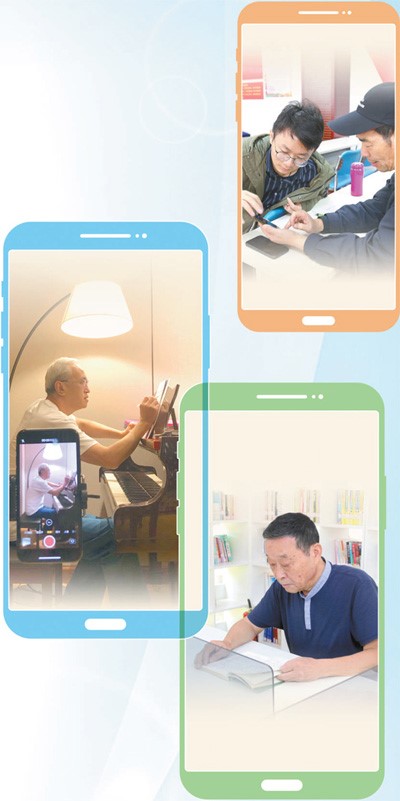(Peoples Daily Online)13:17, August 03, 2020
While the mobile internet is profoundly changing the way people live, senior citizens in China are increasingly getting in on the digital world, despite some barriers.
Yang Su, a 60-year-old professional micro vlogger, is among them. With more than 2.3 million followers on China鈥檚 famous short video app Douyin, his videos have been watched by over 100 million times.

Pictures show Luo Xu teaching a senior citizen how to use a smartphone (UR), Yang Su (L) recording a short video, and Ding Qiulin reading a book at a community library.
鈥淭wo years ago, my son uploaded a clip of me playing the piano at home, and merely hours later it was played over 1 million times,鈥?Yang recalled.
After graduating from the Shanghai Conservatory of Music, he was a pianist of the Shenzhen Symphony Orchestra. The internet has opened a door to a whole new world for him. Over the course of two years, he has filmed over 600 short video clips and opened an official account on social platform WeChat to share articles and offer online piano courses.
It鈥檚 not easy for him to learn how to film a video, something that might not be easy even for young people. Spending a long time staring at the music sheets always causes eye soreness, and he needs to play through the music since he doesn鈥檛 know how to edit and cut clips.
According to Yang, the lighting, framing and camera angles were always not right at the beginning, so his child helped him a lot later.
鈥淭he internet has opened the door to a new world,鈥?Yang said, adding that he has kept himself occupied and always feels young at heart regardless of his age.
However, some seniors aren鈥檛 taking as quickly to the new technology. Ding Qiulin, a 72-year-old retiree in Puyuan community, Changsha in central China鈥檚 Hunan province, is one of them. 鈥淚 have used my smartphone for more than one year, but I am only adept in using WeChat for video calls,鈥?he said.
Often unfamiliar or uncomfortable with apps, Ding is intimidated by emerging technology, but has found that supermarkets welcome both mobile payments and cash, and he can still use his bus card to take buses and subways.
Fortunately, the younger generation is pitching in to bridge the digital divide in older adults. Luo Xu, a post-90s volunteer, joined a non-profit organization in Beijing eight years ago to teach the elderly how to surf the internet.
While helping senior citizens ranging between 50 and 90 years old acquire the basics of digital technology to stave off loneliness, Luo found that what the elderly need most is for someone to communicate with them.
鈥淚 feel very satisfied to see that the elderly can seek human communication, companionship and psychological consolation, and feel respected,鈥?he said.
![]()

